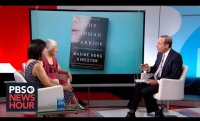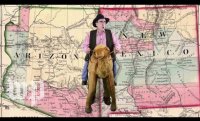Maxine Hong Kingston and Celeste Ng
“Being born a writer, I had to tell, I had to blab these stories out.” Maxine Hong Kingston speaks about her award-winning book, The Woman Warrior: Memoirs of a Girlhood Among Ghosts, (Knopf, 1976) and the power of imagination with Jeffrey Brown and Celeste Ng, who chose the book for PBS NewsHour’s Now Read This book club.











